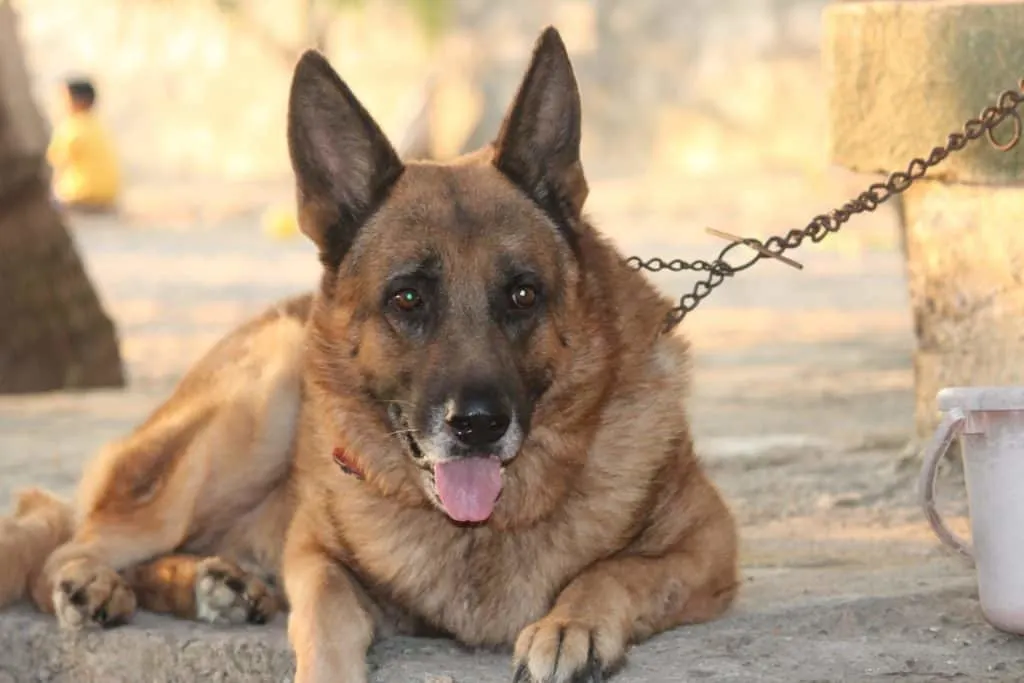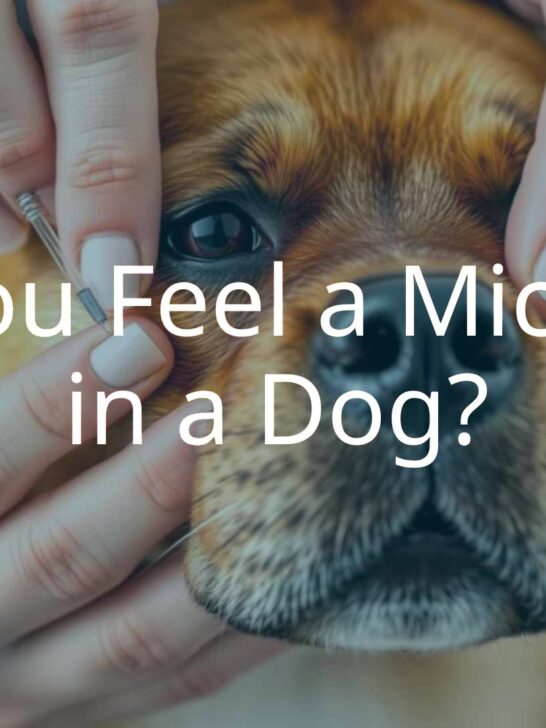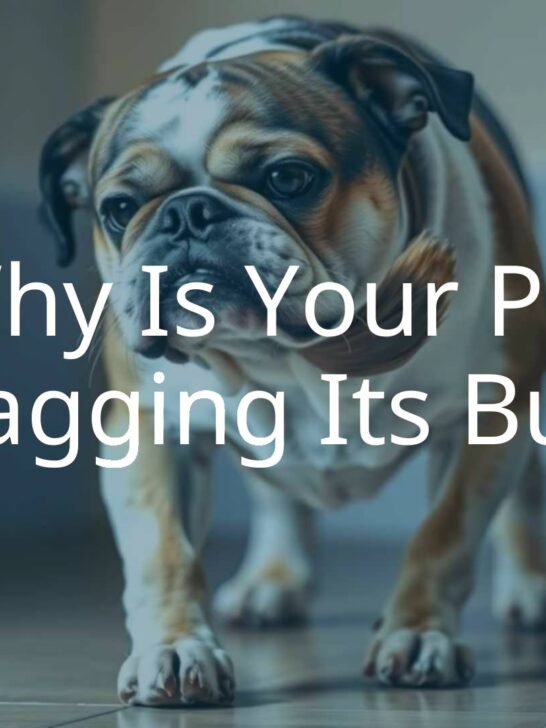How To Tell if your German Shepherd is Overweight
German Shepherds are high-energy dogs that require lots of extensive exercise but, if they don’t get the exercise they need or are fed the wrong foods, this breed is prone to weight gain.
Obesity in dogs is just as common as it is with humans, so it’s super important that we keep a close eye on their weight by managing what they eat and how much exercise they get each day.
So, in this article, we discuss how to tell if your German Shepherd is overweight, what causes weight gain in German Shepherds, and how to get them back down to a healthy weight. Keep reading to find out.

What causes weight gain in German Shepherds?
There are a few reasons why your German Shepherd is gaining weight. Lots of dog owners don’t realize how easy it is for dogs to become obese. Obesity is actually far more common in dogs than humans, so being aware of how you feed and exercise them is very important.
Not enough exercise
German Shepherds need lots of exercise and will benefit from regular walks and the occasional run. Just like in humans, if dogs are consuming more calories than they are burning off, they’re going to gain weight.
Large portions
Even if your dog receives regular walks, if you’re feeding them too much food, they’re still likely to put on weight. Irregular feeding times can also promote unhealthy eating habits, such as greediness. It’s best to have set feeding times and measure out their meals, so you can track their weight.
Unsuitable food
Choosing what you feed your dog is very important and can affect their overall health. Things to consider when buying your dog’s food are the nutritional requirements as well as where they are in their life cycle so, for example, senior dogs benefit from specific dog food, the same goes for puppies.
Look at the calories, and choose brands that provide nutritional ingredients. If your German Shepherd is particularly prone to weight gain, there are weight control dog foods available to buy, too.
Lots of owners tend to treat their dogs to some leftover human food and while you may think a pizza crust or two here and there is totally harmless, these foods are high in fat and offer no nutritional benefits for your German Shepherd.
Over time, this can cause weight gain as well as an upset stomach. Plus, once your German Shepherd has had a taste for things like pizza, it’s likely they’re going to enjoy that a lot more than their dry kibbles and become fussy and refuse their own food.
Post-neutering
Neutering and spaying has been known to slow metabolism in some dogs so, if your German Shepherd has recently been neutered or spayed, make sure to encourage them to run and play and introduce lots of walks to make sure even healthy eating doesn’t result in weight gain.
Illness and genetics
Some breeds are more prone to weight gain than others and unfortunately, German Shepherds are one of them.
So, it’s even more important that you keep an eye on your German Shepherd’s weight. German Shepherds are also prone to joint problems and certain types of joint disease, hypothyroidism and Cushing’s disease.
Cushing’s disease causes dogs to produce too much of the hormone cortisol, this can cause weight gain in dogs.
Hypothyroidism is when the thyroid gland is under-active, causing symptoms like decreased energy and weight gain. This can be particularly dangerous because the lack of energy means they are even less likely to exercise, which will cause further weight gain.
How much should a German Shepherd weigh?
German Shepherds are a large breed, so monitoring their growth is important to know that it is in line with what’s normal for the breed.
As much as you don’t want your German Shepherd to be overweight, you also don’t want them to be underweight.
The desired weight of your German Shepherd will also depend on their age and gender.
An adult German Shepherd will weigh anywhere between 47 and 88 pounds, with adult males typically weighing between 65 and 90 pounds and females weighing between 50 and 70 pounds.
These are just rough averages, to get the best estimate, ask your vet if your dog is a healthy weight.

What are the signs that your German Shepherd is overweight?
The most accurate way to know if your German Shepherd is overweight is to get them checked by a vet and follow their advice, but there are things you can look out for to check how healthy your dog is yourself.
Here are some tell-tale signs your German Shepherd may be overweight:
- Tiredness – if your German Shepherd appears to become exhausted and winded after simple everyday movements that shouldn’t bother them at all, such as climbing the stairs, walking around the house or short walks, this is a sign that something is wrong
- Physical changes – if you can visibly see that your dog has put on weight, you will likely struggle to feel their ribs properly without feeling through a large layer of fat. You should also be able to see their waist. Despite their long coat, German Shepherds should have a visible waist. Also, when looking at your German Shepherd, their chest and rib cage should arch up towards their bellies. If their bellies are hanging lower that their rib cage, then they are overweight
- Mood/behavior changes – a happy and healthy German Shepherd will be alert and interested in playing or running, or any of the usual activities they normally enjoy. If they no longer appear interested, it could be weight related. Playing may be making them too tired, so they avoid it. Plus, if they choose to sleep all day instead of begging you to play or go outside, this is also a sign
- The numbers – This may seem obvious, but finding out exactly how much your dog actually weighs will let you know. Most veterinary surgeries will have weighing scales in the waiting room, so you may not even need to make an appointment. Alternatively, you could just take your dog to the vet for a check-up
How can you manage your German Shepherd’s weight?
The first thing you need to do is identify why your dog is gaining weight, so you can take the best course of action.
Typically, it will just be down to diet and/or exercise which is the best case scenario, because this can be easily fixed.
So, check the ingredients of the food you’re giving your dog and do some research around the brand and whether it’s a good food to be using.
As medium to large sized dogs, German Shepherd are more prone to bone and joint problems, particularly with age, so ensuring your dog is getting their required nutrients every day is super important anyway.
You can purchase weight control dog food that contains all the good nutrients your dog needs. Just make sure when you’re changing your dog’s diet that you do it over a week or two so that it doesn’t upset their stomach.
As well as looking into what you are feeding your dog, you also need to consider whether you could be over feeding them. Checking with a vet to see how much you should be feeding them is the safest way to go about this.
Rapidly reducing your dog’s food intake can make them very ill, so changing their diet should be a gradual process.
You also need to look at how much exercise your dog is getting. German Shepherds are high-energy dogs, so daily exercise is very important.
It’s recommended that German Shepherds need about two hours of exercise or one hour of extensive exercise per day.
If your German Shepherd is already too overweight for extensive exercise, you just need to start them off slow with lots of short walks. You can also encourage them to play more, fetch is great for this.

How much should you feed your German Shepherd?
Your dog should be receiving a healthy amount of protein, carbohydrates, fats, vitamins and minerals, every single day in order to keep them healthy and active.
How much you should feed your German Shepherd depends on their age.
German Shepherd puppies
German Shepherd puppies grow very fast and require lots of nutrients to support their growth and development.
The average German Shepherd puppy needs up to 2,000 calories a day, but it will vary from puppy to puppy, so you should keep an eye on how your puppy is growing.
Adult German Shepherds
How much you should feed your adult German Shepherd depends on their weight.
- For Adults that weigh between 60 and 70 pounds, they should be fed between three and three and a half cups of kibble a day
- If they weigh between 80 and 90 pounds, they should be fed between three ¾ and four and a half cups of kibble per day
Senior German Shepherds
Older German Shepherds are very prone to weight fluctuation, so the amount you feed them can vary.
Senior German Shepherds tend to be hungrier than younger adults, so a good way to avoid over feeding them while still keeping them feeling full is to feed them little and often rather than dividing their daily food into two feeds.
It’s important to measure out your dog’s food because giving them too much can be easily done if you just pour from the bag straight into the bowl, especially if your dog has a large food bowl.

What food should you give your German Shepherd?
Typically, dog food will either be dry food or wet food, or you can also get semi-moist food. The general advice when asked what type of food you should feed a German Shepherd is a mixture of dry and wet food.
You should aim to feed them mostly dry food, with a smaller ratio of wet and semi-wet food. Your dog will certainly prefer wet food as this is by far the tastiest of the dog food options, after human food of course, but because your dog doesn’t need to chew it, it doesn’t have the benefit of keeping your dog’s teeth clean, and it’s more expensive than other forms of dog food.
Semi-wet food is actually quite hard for dogs to digest, so this is not a great option for your German Shepherd. They are pretty high in sugars and often include food coloring and other preservatives, which don’t offer your dog any nutritional benefits.
Tips for feeding your German Shepherd
When it comes to feeding your dog, the type of bowl you use can also play a part in their weight loss.
Using a smaller bowl
This will make it harder for you to over feed them because the bowl is much smaller, so it will fill up much faster.
Using a slow feeding bowl
Lots of dogs tend to eat super fast which can be bad for a number of reasons including gas, vomiting, upset stomach and more.
Rapid eating has also been shown to link to obesity in dogs. By eating really fast, your dog finishes the food before his brain has even had the chance to register that they’re full, which can result in overeating.
In deep-chested breeds like German Shepherds, breathing in lots of air due to eating really fast can cause them to develop ‘bloat’, a condition German Shepherds are prone to developing.
When this happens, the dog’s abdomen fills up with air and the stomach twists, cutting off the circulation to their vital organs. If not treated, bloat can actually be fatal.

Ways to exercise your German Shepherd
As we’ve said, daily exercise is a great way to ensure your German Shepherd remains a healthy weight.
Here are some ways you can keep your furry friend happy and healthy:
- Play fetch – this is an obvious one, but playing fetch is something that will be a great workout for your pooch without having to do very much exercise yourself, so if you’ve had a busy day and don’t feel like a long walk you could play fetch instead
- Dog park – If your dog is friendly with other dogs, and well-behaved off the lead, taking them to run around the dog park is a great way for your German Shepherd to blow off some steam and burn some calories
- Running – if you’re up for it, going for a run with your German Shepherd is the perfect way to get in some extensive exercise for you and your pooch
- Hiking – another activity good for you and your dog. You’ll get to see some beautiful scenery and change up your usual walking routine
- Swimming – taking your dog for a swim in a river or the ocean is another great way for them to exercise while being gentle on their joints. German Shepherds love the water and swimming – this option is super fun for them!
What are the risks associated with obesity in German Shepherds?
If your dog is overweight, and you don’t do anything to reverse it, there are several health risks associated.
Some of these include:
- Injury
- Reduced lifespan
- Back pain
- Joint pain
- Breathing problems
- Urine incontinence
- Arthritis
- Cancer

When should you contact your vet?
If you are struggling to get your German Shepherd’s weight back on track, you shouldn’t give up or keep trying unsuccessfully, you should seek advice from your vet.
Even if you think you are combatting your dog’s weight loss well, it’s still a good idea to take them for a routine check up to check on their progress and make sure their weight gain isn’t the result of an underlying condition rather than food and exercise.
If you think your German Shepherd is gaining weight because of an underlying condition, you should contact your vet immediately, as they may need special medication or even surgery.
Final say
Keeping on top of your German Shepherd’s weight is an important element of their care from when they are a puppy right through to old age.
Fortunately, getting them back down to a healthy weight is easily done. With a few more walks per week and some gradual food restrictions, your German Shepherd will quickly be feeling happy and healthy again.
Plus, your furry friend will certainly be more than grateful for all those extra games of fetch and long walks!



















